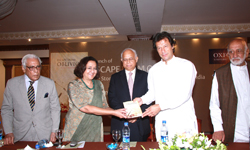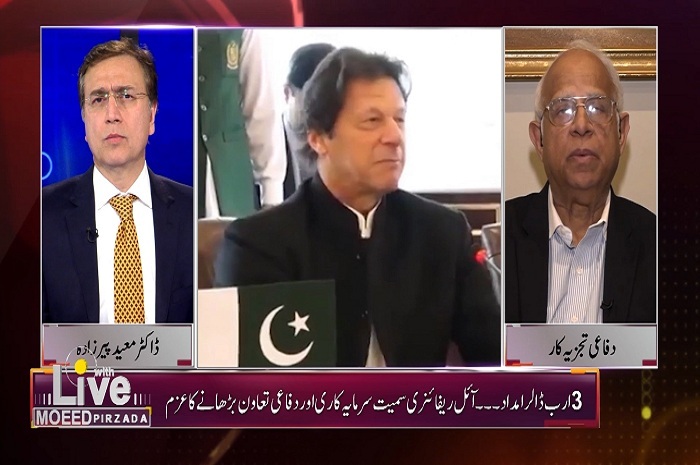While attending World Economic Forum (WEF), at Davos in January 2020, Prime Minister Imran Khan stated that his stay had been sponsored by a Pakistani businessman, Ikram Sehgal, and did not involve expenses to the exchequer. Anywhere else, a businessman paying for a head of government’s foreign junket would raise at least some question. But not in Pakistan. Retired Major Ikram Sehgal seems to be able to be a businessman, a newspaper columnist, and a facilitator of Prime Minister Imran Khan without Pakistan’s establishment and its many defenders even wondering if a ‘conflict of interest’ is involved.

Ikram Sehgal is a retired Pakistan army officer. He is the Chairman of Pathfinder G4S, a company that owns defence and logistics businesses across Pakistan. He was previously also associated with Pakistan Security & Management Services (Private) Ltd and Wackenhut Pakistan (Pvt) Ltd, SMS Couriers (Private) Ltd, Pathfinder (Private) Ltd (Trade and Countertrade).
Sehgal regularly appears on Pakistani tv, writes for The News, The Daily Times, Pakistan Today and even travels the world claiming to be a strategic affairs and defense analyst. However, the reality is that Sehgal is first and foremost a businessman who makes his money from defence and security contracts, including contracts with foreign governments.
In 2009, Sehgal wrote pieces in The News titled ‘Just Say No’ and ‘The Ultimate Defining Moment’, praising Hilary Clinton’s visit to Pakistan. What he didn’t disclose while writing those pieces was that he was head of SMS Security Company which is tied up with Wackenhut Services, a US-based private security services provider. Wackenhut-SMS was one of the contractors who provided security to the American embassy and to Americans in Pakistan.
In 2011, Sehgal wrote a piece for The News arguing that the Supreme Court of Pakistan should give up trying to enforce rule of law and that it should instead accept that military intervention may be necessary. One year later in 2012 he wrote another piece in The News calling on the Chief Justice of Pakistan once again to give military dictatorship a chance.
Every year since 2002, Ikram Sehgal’s Pathfinder Group has organized the Pakistan Breakfast at Davos. For the past 6 years the Martin Dow Group has been a co-host as well.
Ever since 2011, Sehgal has been promoting Imran Khan in the international media and at fora like Davos. While in previous years, either Pakistan’s then President or Prime Minister would be the chief guest, between 2011- 2013, the Chief guest was Imran Khan, even before Khan became Prime Minister.
At WEF Davos in 2013, Sehgal told Bloomberg that “Imran represents the hope for the future of Pakistan.”
In 2011, Sehgal told Los Angeles Times that “Khan is speaking the language of the streets.” Over the last few years, Sehgal has mentioned Khan often in his writings and analysis.
At the 2012, launch of Sehgal’s book, ‘Escape from Oblivion: The Story of a Pakistani Prisoner of War in India,’ Imran Khan was the chief guest and other speakers were Javed Jabbar, Lt Gen. Ali Kuli Khan, Brig. Muhammad Taj, and Brig. A.R. Siddiqi.
In 2018, when Imran took over, Sehgal said in a quote to the New York Times “Mr. Khan needs to sit down with the military and figure out what are the national security objectives. Everyone should be on the same page.” He also wrote an OpEd titled “Imran Khan begins the task by speaking for the long-ignored people” in which he said “Imran Khan won over the hearts of the masses by his very candid and honest manner in his address to the nation as PM. Delivered from the heart in plain words, his talking points scribbled in his own handwriting he meant what he said. The nation has been waiting to hear from their leaders for the last 71 years about the poor-rich divide and the vital issues haunting the masses on the poverty line or barely above it.”
Sehgal’s OpEds on Imran Khan appear to simply fawn over Khan, instead of providing any analysis.

‘Imran Khan at the UN,’ Daily Times, October 5, 2019
“In Imran Khan Pakistan has for the first time a Prime Minister who has an entirely different background than all previous ones. Not belonging to a feudal family like the Bhuttos and Sharifs with all the restrictions that come with that. Western educated and well connected in the understanding of the western world and its rules and sentiments, he is a middle class person with no assets ‘beyond known sources of income’ which makes him able to really feel the pain of the poor. And he has charisma and is emotional that makes him resound with Pakistanis and – as we have seen – even with the representatives present at UNGA.”
‘Proud of you, Imran,’ Daily Times, July 23, 2019
“All of Imran Khan’s trips abroad as PM has been of great importance to Pakistan. The most anticipated (and more important than others) was his 3-day trip of the United States (US). Primarily Pakistan badly needed to mend fences with the US on a number of thorny issues, secondarily we had to attract very much needed investment. Travelling with a small delegation to Washington DC on a Qatar Airways commercial flight to save money, this trip has cost the national exchequer about US$ 50,000 cost of former PM Nawaz Sharif’s last trip to the US was reportedly US$ 470,000. Imran Khan opted to stay at the Pakistani Ambassador’s residence instead of a hotel in order to further cut costs.”
It is all too apparent what Imran Khan gets from Ikram Sehgal: lots of praise and the opportunity to attend the Davos forum at Sehgal’s expense. The questions is, what, if any, interest of Ikram Sehgal is served by this relationship?
The Pakistani newspapers who publish his articles as if these are written by an uninterested party also need to answer why allow a promoter of Khan such access to their columns. Sehgal might claim he only does what he does out of a patriotic duty. But the reason why conflict of interest rules and procedures exist in most governments and most countries is precisely to make sure that someone other than the parties involved determines whether a relationship is above board.
![]()





